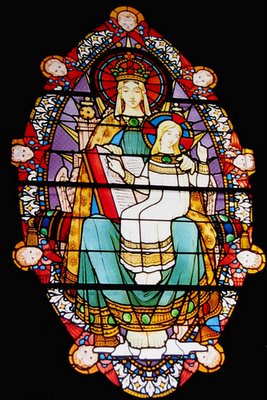O Sapientia
 "O Sapientia, quae ex ore Altissimi prodisti, attingens a fine usque ad finem, fortiter suaviter disponensque omnia: veni ad docendum nos viam prudentiae."
"O Sapientia, quae ex ore Altissimi prodisti, attingens a fine usque ad finem, fortiter suaviter disponensque omnia: veni ad docendum nos viam prudentiae."'O Wisdom, you come forth from the mouth of the Most High. You fill the universe and hold all things together in a strong yet gentle manner. O come to teach us the way of prudence.'
"We sing to the Wisdom that spoke for itself in Old Testament, opening her mouth in the assembly of the Most High. Specifically, we call on Wisdom in the words of Jesus ben-Sirach... It is as the men and women we are that we come before God, praying Messiah to come. We are people with whole areas of experience that have no obvious and immediate religious significance. Such areas are, we say, secular, belonging to the world. Yet it was this world that God loved so much that he sent his Son, his Wisdom, into it.
Jesus ben-Sirach wanted to unify the inter-relationship of God and the individual with the day-to-day affairs of living in the world, getting on or at least getting by. This can be found in the idea of Wisdom, for Wisdom, he says, can be found in God himself; it is written into the very structure of the world; and it is offered to everybody, but especially to those who love God. This discovery of his set the pattern for all subsequent reflection in the Jewish-Christian tradition on the unity of God's work in creation, providence and redemption... And so we are constantly being asked to find out how the God who creates and sustains and redeems is one God, how he speaks only the one Word through whom all things were made, in whom all things hold together and who was translated into flesh and blood in a particular historical individual, in Jesus of Nazareth.
We pray to Wisdom to come, and to teach... If we are going to be taught by Wisdom herself we have to be ready to be taught by people and situations, for Wisdom reaches mightily from one end of the earth to the other and gently orders all things. The Wisdom which is incarnate in Jesus of Nazareth is not a different wisdom from that which underlies the laws of nature and the laws of human nature and the laws of history. If we tried to learn only from supernatural wisdom which was not available in the world of history and nature and other people, then it would not be the Wisdom to whom we sing in Advent that would be teaching us. The Wisdom to which we sing reaches mightily from one end of the earth to the other and the more we enlarge our sympathies to reach out like Wisdom the more likely our chance of hearing the echoes of its voice and learning from it. Human culture can be an obstacle to those dispositions which enable us to hear Wisdom's voice, but more frequently the hurdles lie with our inadequate sympathies, our over-narrow range of interests. It is false to our Christian tradition, it is unwise, to try to flee from the world which God loved so much that he sent his Son, his Wisdom, to it. It is wise to flee from the world that is at enmity with God, but that world is what we have made of the world. It is the world we have made against God, made out of our enmity with God, and not the world as such. The desire for God cannot bypass a reverence and respect and indeed a love for what God is his Wisdom has created, and created good, and created very good.
And what we want to learn from Wisdom... is the way of prudence. There is nothing we can more properly ask of Wisdom than how to be prudent. Only if we have prudence, that is, discretion, discernment, a sense of the realities of things and persons and situations, can we give a welcome to Wisdom. Catherine of Siena, meditating on the story of the annunciation when Eternal Wisdom did come first, sees Mary as exercising the virtue of prudence in her conversation with the Angel. Prudence made her ask the right questions and prudence enabled her to give the appropriate reply... And so we pray first of all to be taught the way of prudence, too be taught how to live a life that is in all things pleasing to God, how to become a saint... Ask God to teach you the way of prudence, how to behave in appropriate ways along the ordinary paths of this earth. It was those common paths that Jesus of Nazareth trod and, in treading, became the Way itself, the way which led up to Jerusalem and which once led and still leads to the Father.
It is Eternal Wisdom whom we pray to come and teach us the way of prudence. Ordinary prudence comes from Eternal Wisdom. We may fairly expect that by looking towards him we will discover how to be prudent. In its most palpable form, this looking is towards him as he was and is embodied in the flesh and blood of Jesus of Nazareth, the risen and glorified Christ of our faith. We learn the way of prudence by studying the book of Christ crucified in which Bonaventure told Thomas Aquinas he had learnt all his wisdom."
- Geoffrey Preston, OP, 'Hallowing the Time'
The image above is of Mary, Seat of Wisdom from a stained glass window in the basilica at Fourviere in Lyon.







0 Comments:
Post a Comment
<< Home